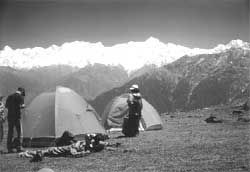Paradox, at the altitude
 after a three-week research, a team of high altitude medical researchers from Nepal and Italy have concluded that people suffering from a certain type of mild asthma get respite at a high altitude.
after a three-week research, a team of high altitude medical researchers from Nepal and Italy have concluded that people suffering from a certain type of mild asthma get respite at a high altitude.
In total, four tests were conducted at different levels on 12 people suffering from mild asthma. They were first tested for asthma or "obstructive airway disease" at 1,300 metres above sea level in Kathmandu, the Nepalese capital. They were then tested at 3,400 metres, then at 4,300 metres and finally at 5,050 meters at Lobuche in the Khumbu region of the Nepalese Himalaya.
The trekkers were given a dose of methacholine, which induces obstruction in the airways. The functioning of the lungs was then measured with the help of a spirometer. This experiment is also known as "Methacholine Challenge and Spirometry" and is regarded as the "gold standard for testing asthma".
"As we climbed up, we had to increase methacholine doses for obstruction of the airways. We found the lungs to be more stable at higher altitudes," says Buddha Basnet, who specialises in high altitude medicine. He along with Analisa Cogo, an Italian researcher, conducted the study. "This revelation came as a surprise to us because before this finding we had always believed that such people would suffer from a severe asthma attack because of the cold and fatigue from trekking," he added.
Talking about the reason to conduct this research, Basnet says, "A lot of tourists visiting Kathmandu want to go to the mountains. They often come to me to find out whether they are eligible and I always suggested that they should take precautions and a lot of medicine. Contrary to my suggestions, many of them came back from the trek and told me that they needed less medicine in the mountains. This led me to undertake the study."
However, he emphasised the need to conduct further research on the subject. "We conducted our research for three weeks on a small sample size because of which we are not in a position to make specific recommendations to such patients" says Basnet. "But the research has shown some hope and if we conduct the same on a larger-scale we will have something more concrete to recommend," he added.
